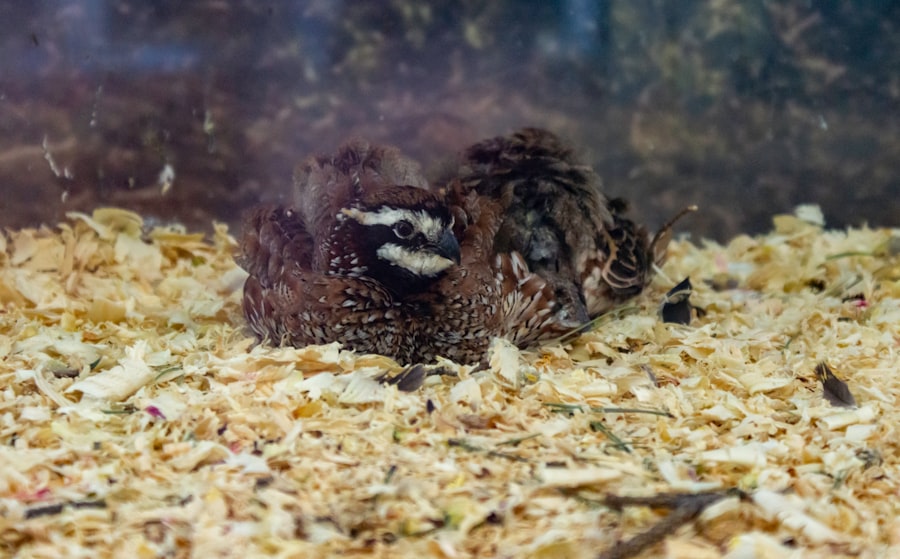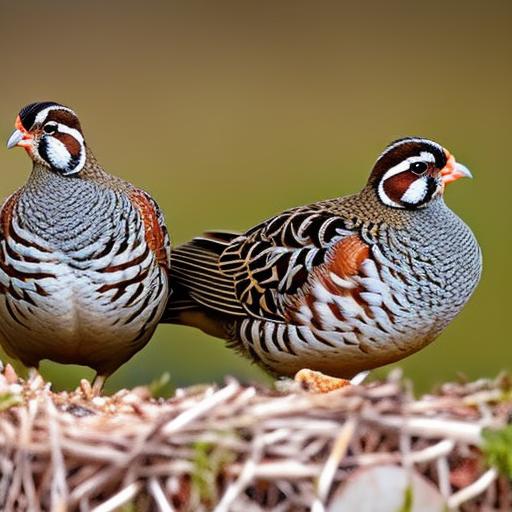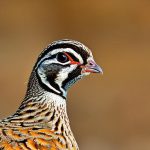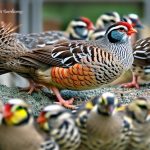Quails are small, ground-dwelling birds that make unique and interesting pets. They are known for their gentle nature and social behavior, making them a popular choice for bird enthusiasts. Quails come in a variety of species, with the most common being the Japanese quail, also known as the Coturnix quail. These birds are relatively easy to care for and can be kept in small spaces, making them an ideal pet for those with limited outdoor space.
Quails are social animals and thrive in the company of other quails. They are known for their gentle and non-aggressive nature, making them suitable for keeping in groups. However, it’s important to note that quails can be skittish and may startle easily, so they should be handled with care. Additionally, quails are known for their distinctive vocalizations, which can range from soft chirps to loud calls. This makes them an interesting and entertaining addition to any household. Overall, quails are charming and low-maintenance pets that can bring joy and companionship to their owners.
Key Takeaways
- Quails are social birds that can make great pets, but they require proper care and attention.
- A suitable quail habitat should include a secure enclosure, nesting areas, and access to fresh water and food.
- Quails should be fed a balanced diet of commercial quail feed, supplemented with fresh greens and protein sources.
- When handling quails, it’s important to be gentle and avoid stressing them out, and regular health checks are essential for their well-being.
- Breeding and raising quail chicks requires a separate brooding area and specific temperature and humidity conditions. Additionally, it’s important to be aware of local regulations and obtain any necessary permits for keeping quails at home.
Setting Up a Quail Habitat
When setting up a habitat for quails, it’s important to provide them with a safe and comfortable environment that meets their specific needs. Quails are ground-dwelling birds, so they require a habitat with plenty of floor space. A large enclosure with a solid bottom is ideal for quails, as it allows them to move around freely and engage in natural behaviors such as dust bathing and foraging. The enclosure should also have a secure lid or cover to prevent the quails from escaping and to protect them from predators.
In addition to a spacious enclosure, quails also need access to a sheltered area where they can rest and seek refuge from the elements. This can be provided in the form of a small coop or shelter within the enclosure. The habitat should also include a variety of enrichments such as perches, hiding spots, and toys to keep the quails mentally and physically stimulated. It’s important to regularly clean the habitat to maintain a healthy living environment for the quails. Overall, providing a spacious and enriching habitat is essential for the well-being of pet quails.
Feeding and Watering Quails
Feeding and watering quails is an important aspect of their care and requires careful attention to ensure their nutritional needs are met. Quails are omnivorous birds that require a balanced diet consisting of both commercial quail feed and fresh foods. A high-quality commercial quail feed should make up the majority of their diet, as it provides essential nutrients and vitamins necessary for their health. Additionally, quails can be offered a variety of fresh foods such as fruits, vegetables, and protein sources like mealworms or boiled eggs as occasional treats.
In addition to a nutritious diet, quails also require access to clean and fresh water at all times. Water should be provided in shallow dishes or waterers that are easily accessible to the quails. It’s important to regularly clean and refill the water containers to prevent contamination and ensure the quails stay hydrated. Monitoring their food and water intake is crucial to identifying any potential health issues early on. Overall, providing a balanced diet and access to clean water is essential for maintaining the health and well-being of pet quails.
Handling and Care of Quails
Handling and caring for quails requires gentle and patient interaction to ensure their well-being. Quails are generally skittish birds that may startle easily, so it’s important to approach them calmly and avoid sudden movements. When handling quails, it’s best to scoop them up from behind using both hands to prevent them from flapping or escaping. It’s important to support their body and wings while holding them to prevent injury.
In addition to handling, regular grooming and care are essential for maintaining the health of pet quails. This includes regularly checking their feet for any signs of injury or infection, as well as trimming their nails if necessary. It’s also important to monitor their overall health and behavior for any signs of illness or distress. Providing a clean and comfortable living environment is crucial for the well-being of pet quails. Overall, gentle handling and attentive care are essential for keeping pet quails healthy and happy.
Health and Wellness of Quails
Maintaining the health and wellness of pet quails requires regular monitoring and proactive care. It’s important to keep an eye on their overall appearance, behavior, and eating habits to identify any potential health issues early on. Common signs of illness in quails include lethargy, loss of appetite, abnormal droppings, or respiratory issues. If any of these symptoms are observed, it’s important to seek veterinary care promptly.
In addition to monitoring their health, providing a clean living environment is essential for preventing illness in pet quails. Regularly cleaning their habitat, providing fresh food and water, and maintaining proper hygiene practices can help prevent the spread of disease. It’s also important to provide regular opportunities for exercise and mental stimulation to keep the quails healthy and happy.
Preventative healthcare measures such as vaccinations and parasite control may also be recommended by a veterinarian to ensure the long-term health of pet quails. Overall, proactive monitoring and preventative care are essential for maintaining the health and wellness of pet quails.
Breeding and Raising Quail Chicks

Breeding and raising quail chicks can be a rewarding experience for bird enthusiasts. Quails reach sexual maturity at around 6-8 weeks of age, at which point they may start laying eggs. To encourage breeding, it’s important to provide a suitable nesting area within the habitat where the female quail can lay her eggs in privacy.
Once the eggs are laid, they should be collected daily and placed in an incubator set at the appropriate temperature and humidity for successful hatching. After an incubation period of around 17-18 days, the chicks will begin to hatch. It’s important to provide a warm and safe brooding area for the chicks with access to food and water immediately after hatching.
Raising quail chicks requires careful attention to their nutritional needs, as well as providing a safe and enriching environment for their development. As they grow, the chicks will require a gradual transition to adult feed and will eventually be introduced to the main quail habitat once they are fully feathered. Overall, breeding and raising quail chicks requires careful planning and attentive care to ensure their successful development into healthy adult quails.
Legal Considerations for Keeping Quails at Home
Before keeping quails as pets, it’s important to be aware of any legal considerations or regulations that may apply in your area. Some localities may have restrictions on keeping certain species of quails or may require permits for keeping them as pets. It’s important to research local ordinances and regulations regarding the keeping of quails before bringing them into your home.
In addition to local regulations, it’s also important to consider any homeowner’s association rules or lease agreements that may impact your ability to keep quails at home. Some residential communities may have restrictions on keeping poultry or livestock within city limits, so it’s important to be aware of any potential limitations before acquiring pet quails.
By being aware of any legal considerations or regulations that may apply to keeping quails at home, you can ensure that you are in compliance with local laws and regulations while enjoying the companionship of these charming birds. Overall, understanding the legal considerations for keeping quails at home is essential for responsible pet ownership.
If you’re considering keeping quails at home, you may also be interested in learning about the ideal flooring for your chicken coop. Poultry Wizard offers a comprehensive guide on the importance of the floor of a chicken coop and how to maintain it for the well-being of your poultry. Check out their article on The Chicken Coop Country Diner for valuable insights into creating a comfortable and hygienic environment for your feathered friends.
FAQs
What are quails?
Quails are small ground-dwelling birds that are often kept for their eggs and meat. They are known for their distinctive calls and are found in various parts of the world.
What do quails eat?
Quails are omnivores and their diet consists of a variety of foods including seeds, insects, and small plants. They can also be fed commercial quail feed which is specially formulated for their nutritional needs.
How do you keep quails at home?
Quails can be kept in a suitable enclosure or coop that provides them with enough space to move around and access to food and water. It’s important to provide them with a clean and comfortable environment to thrive.
What are the benefits of keeping quails at home?
Keeping quails at home can provide a sustainable source of fresh eggs and meat. They are also relatively low maintenance and can be a great addition to a backyard farm or homestead.
Are there any legal restrictions on keeping quails at home?
It’s important to check with local authorities or agricultural departments to ensure that there are no restrictions or regulations on keeping quails at home. Some areas may have specific guidelines for keeping poultry.
What are some common health issues for quails?
Quails can be susceptible to various health issues such as respiratory infections, parasites, and nutritional deficiencies. It’s important to monitor their health and seek veterinary care if needed.
Can quails be kept with other poultry or birds?
Quails can be kept with other poultry or birds, but it’s important to introduce them carefully and monitor their interactions. Providing enough space and resources for all the birds is essential for a harmonious cohabitation.
Meet Walter, the feathered-friend fanatic of Florida! Nestled in the sunshine state, Walter struts through life with his feathered companions, clucking his way to happiness. With a coop that’s fancier than a five-star hotel, he’s the Don Juan of the chicken world. When he’s not teaching his hens to do the cha-cha, you’ll find him in a heated debate with his prized rooster, Sir Clucks-a-Lot. Walter’s poultry passion is no yolk; he’s the sunny-side-up guy you never knew you needed in your flock of friends!







